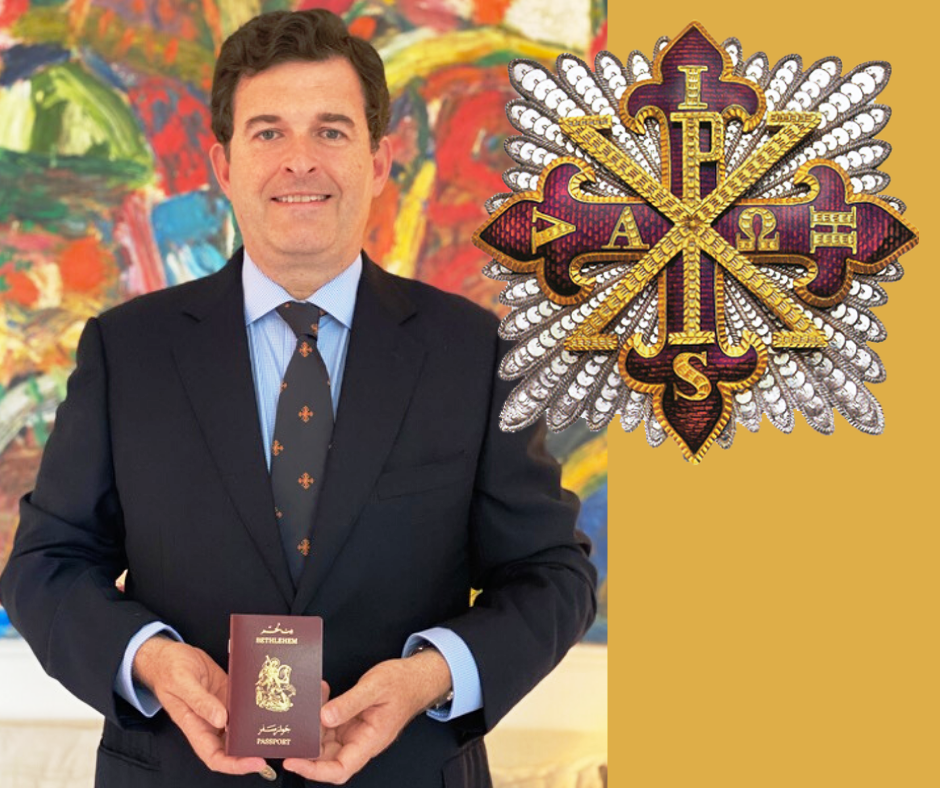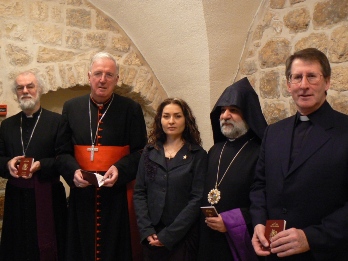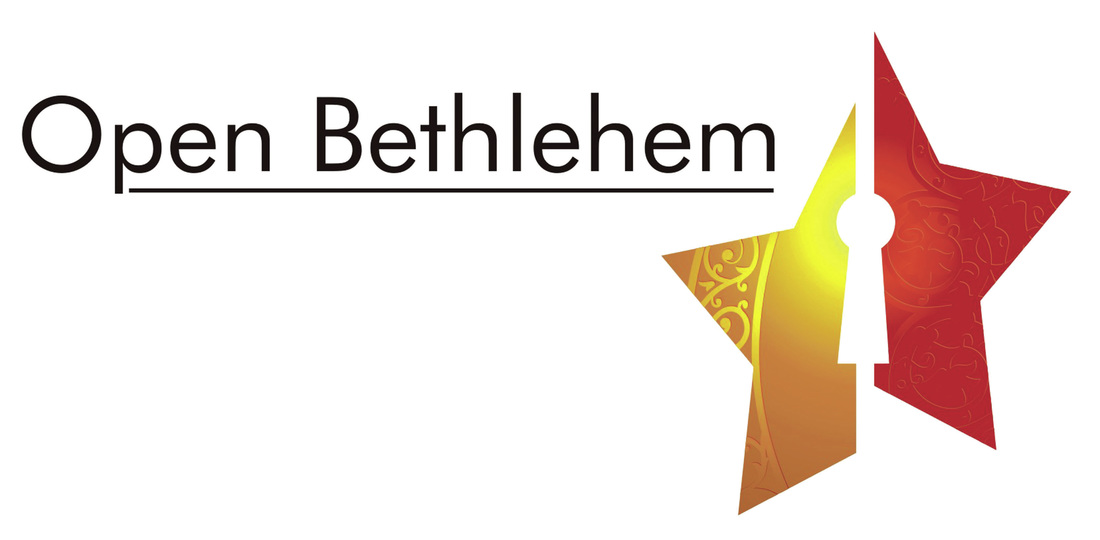 Some years ago, on what was my first visit to the Holy Land, I made that all important pilgrimage to the birthplace of Jesus Christ – the holy city of Bethlehem.
Some years ago, on what was my first visit to the Holy Land, I made that all important pilgrimage to the birthplace of Jesus Christ – the holy city of Bethlehem.
Since childhood I had dreamt of visiting this city for it represented the birthplace of an important part of my identity as a Christian. Looking back, it was a visit profoundly and spiritually moving and yet deeply shocking and distressing in equal measure.
It was moving to know you are visiting and praying on the spot where the Saviour was born, but shocking to see the ‘little town of Bethlehem’ surrounded by a menacing nine meter high concrete wall topped with barbed wire and watch towers. Israel says the wall is needed for its security but the result has been a dramatic isolation of Bethlehem, an isolation that threatens the life and the future of its communities.
The Wall
The visit brought back to me other trips I made over the years to the once divided Germany and wider Warsaw Pact nations and also to parts of the divided island of my native Ireland. Those images of isolation and divide never left me. Yet at the same time my pilgrimage to Bethlehem filled me with a sense of real optimism knowing that much like the German and the Irish walls, this Israeli wall in the heart of the Holy Land will inevitably fall one day and divided communities on both sides would be reunited.
Future of Christian Community
One lady whom I met on that journey was Leila Sansour. She inspired me to look closer and deeper at what was around me. She was well placed to do so as she comes from one of the oldest Roman Catholic families in Bethlehem who can trace their roots back more than 500 years. For her Bethlehem is not only holy, it is also home. Yet, the more I listened to her stories the more I realized how precarious she felt her future is in this land. It will take a lot for the Christian community to survive the challenge.
But, she was not going to give up. She told me, how in 2005, while working on a film about Bethlehem, she had also founded and launched Open Bethlehem – an organisation which works to encourage greater international engagement with the city to help preserve its heritage and communities.
The project seeks to build global support for the city through a network of ambassadors, honorary citizens, who pledge to work to give Bethlehem a greater voice and help raise awareness about the challenges it faces today. On my part, it felt wonderful to be able to support such a worthy organisation and such an important cause.
Historic Visit by Church Leaders
 I first became aware of Open Bethlehem when the Constantinian Order’s then Delegation Prior and knight in Britain, Cardinal Cormac Murphy-O’Connor, recounted the powerful Christmas Day visit he made with the then Archbishop of Canterbury and fellow delegation knight Dr Rowan Williams in 2006. The visit came following a series of meetings in London with Open Bethlehem during their launch and appeal to the heads of churches. The late Cardinal reminded me that much like the Constantinian Order, Palestine shares St George as its patron saint and that we as knights and dames should try to help and build a partnership with this city.
I first became aware of Open Bethlehem when the Constantinian Order’s then Delegation Prior and knight in Britain, Cardinal Cormac Murphy-O’Connor, recounted the powerful Christmas Day visit he made with the then Archbishop of Canterbury and fellow delegation knight Dr Rowan Williams in 2006. The visit came following a series of meetings in London with Open Bethlehem during their launch and appeal to the heads of churches. The late Cardinal reminded me that much like the Constantinian Order, Palestine shares St George as its patron saint and that we as knights and dames should try to help and build a partnership with this city.
Archbishop’s words
I remember too being so moved by another of our Order’s senior ecumenical knights, Nobel Peace Prize winner Archbishop Desmond Tutu who said of Leila’s work “Open Bethlehem is a nonviolent attempt to save a city that belongs to many in the world. It is unconscionable that Bethlehem should be allowed to die slowly from strangulation.” I cannot agree more with his sentiment and I am very keen to share with you here Leila’s account of Bethlehem in recent months as the city comes out of one lockdown, an experience shared around the world, into another one that it has to endure on its own- that of an iconic city besieged and kept away from the eyes of the world.I very much hope that her account will move you, just like it moved me to do everything you can to support this very worthy project and help us promote the interests of Bethlehem at a time when the city needs us most.
The last few months in Bethlehem
 I was in London when the Covid-19 lockdown was announced in Bethlehem. This meant I wasn’t going to be able to make my way back home any time soon. You could argue I was lucky to be stuck in London. Bethlehem’s modest medical facilities will never compare to those of Britain, but I was really worried about everyone I left behind. I sat down and thought about all the times Bethlehem made me worry about its plight- so many if you know the town’s recent history!
I was in London when the Covid-19 lockdown was announced in Bethlehem. This meant I wasn’t going to be able to make my way back home any time soon. You could argue I was lucky to be stuck in London. Bethlehem’s modest medical facilities will never compare to those of Britain, but I was really worried about everyone I left behind. I sat down and thought about all the times Bethlehem made me worry about its plight- so many if you know the town’s recent history!
A call
It was at this point that I received a call from Anthony Bailey OBE – a renowned inter-faith campaigner and a long term supporter of my work. He asked me to write about my town to share its latest news with members and supporters of the Constantinian Order. I was, of course, only delighted to do so and infinitely grateful that he had remembered us at this challenging time. Anthony has been a longstanding visitor and true friend of our city. More specifically, over the years, he has been a great supporter of Open Bethlehem – a project we launched in 2005 to put Bethlehem on the international map. In recognition of this support, Anthony was granted the Bethlehem passport, a symbolic honorary citizenship of the city.
Anthony joins an imminent list of persons from all walks of life who have been so recognised because of their friendship and loyalty to our city and its people. These include notable global leaders such as Pope Benedict XVI, Anglican Archbishop of Canterbury Dr Rowan Williams, Nobel Peace Prize winners Archbishop Desmond Tutu of Cape Town and Malala Yousafzaiand US President Jimmy Carter among others.
The Open Bethlehem project came as a response to the building of the Israeli wall around Bethlehem. The wall was and remains an enormous challenge to a city that has shaped its life by being open to the outside world and whose economic life is so reliant on tourism. As I say in my film “If Jesus was born in your town, you would have no choice”. Throughout history, even during dangerous times, people would come, and we learnt to welcome them. If you consider that most hotels, souvenir shops and restaurants in Bethlehem belong to Christians families (historically the city’s majority), you will realise how precarious the future of the Christian community is in Bethlehem. At the start of any economic or political unrest they are the first to leave simply because they can still afford to. Who would stay in a city without a future?!
Bethlehem keeps me worried
So, I hope you understand what I mean when I say Bethlehem keeps me worried. The most recent lockdown was announced there early, on 5 March. A few Greek tourists tested positive for the coronavirus upon their return home from Bethlehem and the city was immediately put on high alert. There simply was no capacity whatsoever to deal with any such threats. Bethlehem has only 4 ICU units. Few days later, all roads in and out of Bethlehem were locked. All tourist sites, all hotels and all public institutions including schools and universities had to shut down. Bethlehem had barely come out of a long period of depression and isolation so this was truly unbearable news.
It was remarkable, nevertheless, to see yet again, how resourceful my city proved to be in critical situations. The municipalities sprang into action. People pulled together. The CARITAS hospital in Bethlehem learnt how to do the testing. Hebron, a neighbouring town, quickly turned three factories to manufacturing protective personal equipment and a number of institutions continued teaching and conducting business online albeit at a fraction of their normal productivity- just like everywhere else. The Nativity church – the site marking the birth place of Jesus Christ, also went online allowing everyone to access Sunday mass while its actual doors remained closed.
 What now for Bethlehem?!
What now for Bethlehem?!
At some point, it seemed that Bethlehem has managed to contain the virus. Three weeks ago, only 60 cases have been detected- all have recovered. But, with the recent opening of the town, the problem has resurfaced. Coming out is a huge health gamble for Bethlehem but the city can no longer sustain the lockdown. A large percent of the population lead a hand to mouth existence. Many of those who are in a slightly better position work in the tourism sector, which, due to current restrictions on international movement and flights, is not likely to begin the journey to recovery for at least two years.
It feels monstrous, at a time like this, that we also have to face the prospect of Israel’s decision to annex large chunks of the West Bank leaving us even more impoverished and disconnected. The process has already started brutally and at pace. Never mind a pandemic, our more fundamental challenges, our abject isolation now rise so acutely in front of our eyes. No matter how the chapter with the disease ends, we will still remain behind a wall, under military occupation, with no control over our resources or the running of our economy. We will still remain a city without a future.
It is times like these that remind us why we started Open Bethlehem and it is, at times like these, that we turn to you for support. We need to educate our friends around the world and people in positions of influence about the dangers we face. We need to help everyone understand the urgency and the need to work together to change the tide.
We appeal to you!
We want to preserve Bethlehem’s heritage. We want to remain an open city that symbolises “Joy and Goodwill to all” and, when you come to visit us, we want you to be able to celebrate mass with a vibrant indigenous Christian community that keeps churches alive so that you know you are visiting The Holy Land, not a biblical Disneyland.
We hope that this reminder might spark something in your heart and that you will take some time to find out more about Open Bethlehem and our work and that, just like Anthony Bailey, you would consider partnering with us and becoming a supporter of Open Bethlehem’s vital work in these challenging times.
For more information on the work of Open Bethlehem please visit openbethlehem.org and for more information on the Constantinian Order please visit constantinian.org.uk . You can support Open Bethlehem here.

